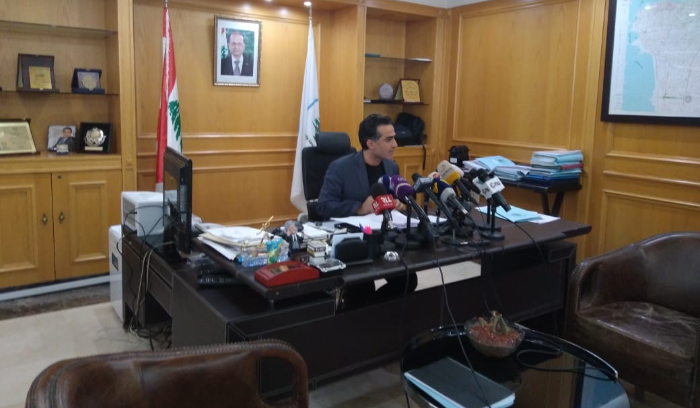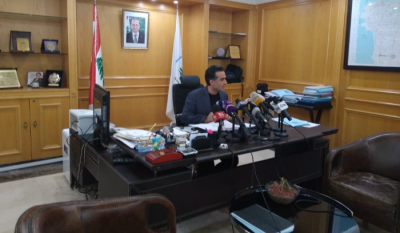The Minister of Public Works and Transport in the caretaker government, Dr. Ali Hamieh, held a press conference in his office at the ministry, attended by the family of the late artist George Rassi. The conference addressed traffic safety on classified road networks and the establishment of cooperation and coordination among various administrations, including a reassessment of the relationship between the relevant departments and related councils.
Initially, Hamieh expressed his condolences to Rassi’s family and to all those who have fallen victim to road accidents in Lebanon. He described the state of roads in Lebanon, stating that their total length is 6,700 km. Additionally, he noted unclassified roads and internal roads, bringing the total length of the road network in Lebanon to 22,000 kilometers. He pointed out that "there is a study in the ministry based on global standards, confirming that the cost of construction for 6,700 km is $3.5 billion, and necessary maintenance is set at 3% of construction costs, meaning that maintenance costs should be $105 million, which today equals approximately 4 trillion Lebanese pounds, while the current ministry budget project is 39 billion, roughly equivalent to $1 million for the maintenance of all classified road networks."
He explained that he sent a letter to the Council of Ministers requesting an additional allocation of 2 trillion Lebanese pounds on top of the budgeted amount of 250 billion Lebanese pounds for road maintenance in 2022, questioning whether this amount is enough to achieve public safety throughout Lebanon. He noted that "the Council of Ministers decided in 2019, based on a study conducted by the ministry, to commission specialized consulting offices at a cost of $600,000, which was approved by the Council of Ministers, determining the implementation cost for maintenance and rehabilitation of international highways at $120 million. Subsequently, the Lebanese currency collapsed, and those works remained unfulfilled." He clarified that "we need $220 million, divided into $105 million for regular maintenance and $120 million for the maintenance and rehabilitation of highways," emphasizing that "all roads in Lebanon suffer from public safety issues."
He stated, "Public safety is no less important than food and medicine; therefore, we took several steps, including communicating with the Council for Development and Reconstruction (CDR), as the ministry's role in all projects undertaken by the CDR, from studies to contracts and acceptance of work, is limited to receiving the project maps, thus considering the ministry a storage center. I refused to accept this mechanism, and thus I directed all relevant parties in the ministry to cease working under it."
He urged the CDR to "activate and elevate the coordination and follow-up process between the Ministry of Public Works and Transport and the CDR for all projects related to upgrading and maintaining the road network, particularly the ongoing projects, and to establish a new joint working mechanism to organize the monitoring of works and their proper acceptance, noting that the CDR has expressed readiness to hold meetings to define a joint mechanism in accordance with the applicable laws and regulations."
He also requested the CDR to "reconsider its decision concerning the preparation of a national traffic safety strategy and an action plan funded by the World Bank, proposing to allocate funds designated for establishing a traffic safety strategy or those available for periodic maintenance of the road network immediately to address all black spots on the road network that affect traffic safety and have caused or could cause fatal accidents."
He pointed out that "the CDR, according to the applicable rules and regulations, implements projects assigned to it by the Council of Ministers and replaces all public administrations and public institutions concerning the granting of administrative licenses and necessary permits (according to the CDR establishment law). Moreover, according to the substance of those provisions, the CDR necessarily monitors all projects and plans with no other oversight." He called for "the drafting of a joint memorandum of understanding to establish a new mechanism where there is a permanent representative of the Ministry of Public Works and Transport on all projects at the CDR related to the Ministry."
Regarding contractors, Hamieh called for "the activation of Article 47 of the general terms and conditions stipulating that the contractor who executes the works is responsible for them for 10 years from the date of project acceptance for any construction defects," warning "contractors who violate this provision," and urging a "reassessment of the status of those projects."
Hamieh stated: "I am a minister in a state, not a state with a minister. There is a National Traffic Safety Council chaired by the Prime Minister, which is why I sent a letter calling for a meeting of the National Traffic Safety Council to discuss the provision of public safety and traffic safety factors on the road network in various Lebanese regions."
He added: "The ministry is responsible for ensuring maintenance of lighting fixtures; however, how can lighting be operated in the absence of electricity supply?" He continued, "We hear about donations to carry out traffic safety works at the location of the accident that claimed George Rassi's life, but we only hear such things in social media. Until now, no one has formally submitted a request except for the Lebanese University, which submitted an official letter expressing its willingness to conduct the necessary technical studies and execute them at its own expense."
Hamieh invited "everyone interested in carrying out works related to traffic safety on the classified roads under the ministry to submit according to the proper channels while welcoming these initiatives."




